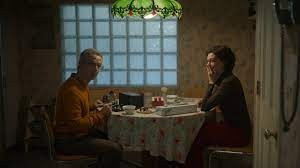Richard Brody in The New Yorker:
 I’m not at the Cannes Film Festival, but a few days ago the festival came to me, at a New York screening of a movie that premièred today at Cannes. The film is James Gray’s “Armageddon Time,” which is of local and national interest, and which makes the connection between the local and the national its very subject. It’s an essentially autobiographical film, set in 1980, in the Queens neighborhood where Gray grew up, and it’s centered on a crucial turn of the historical screw. The movie’s big idea is that the racist and xenophobic political madness that has overtaken the United States in the Trump era has its roots in Donald Trump’s home turf of Queens.
I’m not at the Cannes Film Festival, but a few days ago the festival came to me, at a New York screening of a movie that premièred today at Cannes. The film is James Gray’s “Armageddon Time,” which is of local and national interest, and which makes the connection between the local and the national its very subject. It’s an essentially autobiographical film, set in 1980, in the Queens neighborhood where Gray grew up, and it’s centered on a crucial turn of the historical screw. The movie’s big idea is that the racist and xenophobic political madness that has overtaken the United States in the Trump era has its roots in Donald Trump’s home turf of Queens.
In “Armageddon Time,” the personal is tragically political, and vice versa. The movie is a coming-of-age story in which the young protagonist’s maturation comes at an unbearably high price, at the intersection of privilege and guilt; it’s both a horror story and a tale of a debt that can never be paid; it’s a New York secular-Jewish story that resounds with a quasi-Biblical weight of moral responsibility. Among recent films, “Armageddon Time” most resembles a cross between the Safdie brothers’ “Good Time” (also set in Queens) and Paul Thomas Anderson’s “Licorice Pizza”: like “Good Time,” its overwhelming subject is the presumption and the power of white privilege, and, like “Licorice Pizza,” it delves into the infinitesimal details of memory to rediscover the spirit of the past.
More here.
